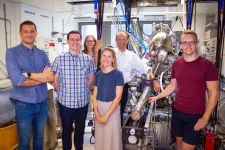(Press-News.org) Embargoed: Not for Release Until 2:00 pm U.S. Eastern Time Thursday, 12 September 2024
‘Even the deepest of rabbit holes may have an exit’
Pathbreaking psychology study reveals conversations with AI models can reduce conspiracy theory beliefs
(WASHINGTON, D.C.) Sept. 12, 2024 – ‘They’re so far down the rabbit hole of conspiracy theories that they’re lost for good’ is common thinking when it comes to conspiracy theorists. This generally accepted notion is now crumbling.
In a pathbreaking research study, a team of researchers from American University, Massachusetts Institute of Technology and Cornell University show that conspiracy theorists changed their views after short conversations with artificial intelligence. Study participants believing some of the most deeply entrenched conspiracies, including those about the COVID-19 pandemic and fraud in the 2020 U.S. presidential election, showed large and lasting reductions in conspiracy belief following the conversations.
Stoked by polarization in politics and fed by misinformation and social media, conspiracy theories are a major issue of public concern. They often serve as a wedge between theorists and their friends and family members. YouGov survey results from last December show that large shares of Americans believe various conspiratorial falsehoods.
In the field of psychology, the widespread view the findings challenge is that conspiracy theorists adhere to their beliefs because of the significance to their identities, and because the beliefs resonate with underlying drives and motivations, says Thomas Costello, assistant professor of psychology at American University and lead author of the new study published in the journal Science[MOU1] . In fact, most approaches have focused on preventing people from believing conspiracies in the first place.
“Many conspiracy believers were indeed willing to update their views when presented with compelling counterevidence,” Costello said. “I was quite surprised at first, but reading through the conversations made much me less skeptical. The AI provided page-long, highly detailed accounts of why the given conspiracy was false in each round of conversation -- and was also adept at being amiable and building rapport with the participants.”
More than 2,000 self-identified conspiracy believers participated in the study. The AI conversations reduced the average participant's belief in their chosen conspiracy theory by about 20 percent, and about 1 in 4 participants — all of whom believed the conspiracy beforehand — disavowed the conspiracy after the conversation.
Until now, delivering persuasive, factual messages to a large sample of conspiracy theorists in a lab experiment has proved challenging. For one, conspiracy theorists are often highly knowledgeable about the conspiracy—often more so than skeptics. Conspiracies also vary widely, such that evidence backing a particular theory can differ from one believer to another.
AI as an intervention
The new study comes as society debates the promise and peril of AI. Large language models driving generative AI are powerful reservoirs of knowledge. Researchers emphasize that the study demonstrates one way that these reservoirs of knowledge can be used for good: by helping people have more accurate beliefs. The ability of artificial intelligence to connect across diverse topics of information within seconds makes it possible to tailor counterarguments to specific conspiracies of a believer in ways that aren’t possible for a human to do.
“Previous efforts to debunk dubious beliefs have a major limitation: One needs to guess what people’s actual beliefs are in order to debunk them – not a simple task,” said Gordon Pennycook, associate professor of psychology at Cornell University and a paper co-author. “In contrast, the AI can respond directly to people’s specific arguments using strong counterevidence. This provides a unique opportunity to test just how responsive people are to counterevidence.”
Researchers designed the chatbot to be highly persuasive and engage participants in such tailored dialogues. GPT-4, the AI model powering ChatGPT, provided factual rebuttals to participants’ conspiratorial claims. In two separate experiments, participants were asked to describe a conspiracy theory they believe in and provide evidence to support. Participants then engaged in a conversation with an AI. The AI's goal was to challenge beliefs by addressing specific evidence. In a control group, participants discussed an unrelated topic with the AI.
To tailor the conversations, researchers provided the AI with participants’ initial statement of belief and the rationale. This setup allowed for a more natural dialogue, with the AI directly addressing a participant's claims. The conversation averaged 8.4 of the participant's minutes and involved three rounds of interaction, excluding the initial setup. Ultimately, both experiments showed a reduction in participants' beliefs in conspiracy theories. When the researchers assessed participants two months later, they found that the effect persisted.
While the results are promising and suggest a future in which AI can play a role in diminishing conspiracy belief when used responsibly, further studies on long-term effects, using different AI models, and practical applications outside of a laboratory setting will be needed.
“Although much ink has been spilled over the potential for generative AI to supercharge disinformation, our study shows that it can also be part of the solution,” said David Rand, a paper co-author and MIT Sloan School of Management professor. “Large language models like GPT4 have the potential to counter conspiracies at a massive scale.”
Additionally, members of the public interested in this ongoing work can visit a website and try out the intervention for themselves.
CONTACT: For more information, please contact Rebecca Basu, AU Communications, basu@american.edu or call (202)-885-5950
About American University
American University leverages the power and purpose of scholarship, learning, and community to impact our changing world. AU’s faculty, students, staff, and alumni are changemakers who shape the future from sustainability to social justice to the sciences. Building on our 130-year history of education and research in the public interest, we say ‘Challenge Accepted’ to addressing the world’s pressing issues.
[MOU1]Insert link to study
END
‘Even the deepest of rabbit holes may have an exit’
Pathbreaking study led by American University professor reveals conversations with AI models can reduce conspiracy theory beliefs
2024-09-12
ELSE PRESS RELEASES FROM THIS DATE:
An exit for even the deepest rabbit holes: Personalized conversations with chatbot reduce belief in conspiracy theories
2024-09-12
Personalized conversations with a trained artificial intelligence (AI) chatbot can reduce belief in conspiracy theories – even in the most obdurate individuals – according to a new study. The findings, which challenge the idea that such beliefs are impervious to change, point to a new tool for combating misinformation. “It has become almost a truism that people ‘down the rabbit hole’ of conspiracy belief are almost impossible to reach,” write the authors. “In contrast to this pessimistic view, we [show] that a relatively brief conversation with a generative AI model can produce ...
How is open access transforming science communication?
2024-09-12
In a Policy Forum, Mark McCabe and Frank Mueller-Langer explore how new open access (OA) mandates and agreements are changing how scientists share their work. They outline key contemporary unknowns in the open access landscape, as well as avenues for continued research. Since 2003, many national governments and international organizations have supported the Berlin Declaration on Open Access (OA) to Knowledge. More recently, some governments and organizations have introduced mandates to ensure open access ...
US food waste bans fail to reduce landfill waste, except in Massachusetts
2024-09-12
State-level bans on commercial organic waste disposal have largely failed to reduce landfilled waste across the U.S., with one state standing out as the lone success, according to a new study. Massachusetts alone achieved a significant reduction in landfilled waste when it implemented food waste bans. The findings underscore the importance of well-designed and enforced policies, with Massachusetts offering a potential model for effective waste management. “Our study shows that food waste bans are far from guaranteed to be successful,” ...
Greenland landslide-induced tsunami produced global seismic signal that lasted 9 days
2024-09-12
In 2023, a massive rockslide in East Greenland, driven by glacial melt, triggered a towering tsunami and a rare global seismic signal that resonated for nine days, according to a new study. The study provides insights into how climate change-induced events like glacial thinning can lead to significant geophysical phenomena with impacts extending throughout the Earth system. Due to climate change, steep slopes are increasingly vulnerable to landslides. In Arctic regions – which are undergoing the most rapid warming globally ...
Climate change-triggered landslide unleashes a 650-foot mega-tsunami
2024-09-12
In September 2023, scientists around the world detected a mysterious seismic signal that lasted for nine straight days. An international team of scientists, including seismologists Alice Gabriel and Carl Ebeling of UC San Diego’s Scripps Institution of Oceanography came together to solve the mystery.
A new study published today in Science provides the stunning solution: In an East Greenland fjord, a mountaintop collapsed into the sea and triggered a mega-tsunami about 200 meters (650 feet) tall. The giant ...
New study reveals food waste bans ineffective in reducing landfill waste, except in Massachusetts
2024-09-12
Of the first five U.S. states to implement food waste bans, only Massachusetts was successful at diverting waste away from landfills and incinerators, according to a new study from the University of California Rady School of Management.
The paper, published today in Science, suggests a need to reevaluate current strategies, citing Massachusetts' approach as a benchmark for effective policy implementation.
Between 2014 and 2024, nine U.S. states made it unlawful for commercial waste generators—such as grocery chains—to dispose of their food waste in landfills, expecting a 10–15% waste reduction.
“We ...
New research reveals how El Nino caused the greatest ever mass extinction
2024-09-12
Mega ocean warming El Niño events were key in driving the largest extinction of life on planet Earth some 252 million years ago, according to new research.
The study, published today in Science and co-led by the University of Bristol and China University of Geosciences (Wuhan), has shed new light on why the effects of rapid climate change in the Permian-Triassic warming were so devastating for all forms of life in the sea and on land.
Scientists have long linked this mass extinction to vast volcanic eruptions in what is now Siberia. The resulting carbon dioxide emissions rapidly accelerated climate warming, resulting in widespread stagnation and the collapse ...
Climate-change-triggered landslide caused Earth to vibrate for nine days
2024-09-12
A landslide in a remote part of Greenland caused a mega-tsunami that sloshed back and forth across a fjord for nine days, generating vibrations throughout Earth, according to a new study involving UCL researchers.
The study, published in the journal Science, concluded that this movement of water was the cause of a mysterious, global seismic signal that lasted for nine days and puzzled seismologists in September 2023.
The initial event, not observed by human eye, was the collapse of a 1.2km-high mountain peak into the remote Dickson Fjord beneath, causing a backsplash of water 200 metres in the air, with a wave up to 110 metres high. This ...
Microbe dietary preferences influence the effectiveness of carbon sequestration in the deep ocean
2024-09-12
Woods Hole, Mass. (September 13, 2024) - The movement of carbon dioxide (CO2) from the surface of the ocean, where it is in active contact with the atmosphere, to the deep ocean, where it can be sequestered away for decades, centuries, or longer, depends on a number of seemingly small processes.
One of these key microscale processes is the dietary preferences of bacteria that feed on organic molecules called lipids, according to a journal article, "Microbial dietary preference and interactions affect the export of lipids to the deep ocean," published in Science.
"In ...
The insulator unraveled
2024-09-12
Aluminum oxide (Al2O3), also known as alumina, corundum, sapphire, or ruby, is one of the best insulators used in a wide range of applications: in electronic components, as a support material for catalysts, or as a chemically resistant ceramic, to name a few. Knowledge of the precise arrangement of the surface atoms is key to understanding how chemical reactions occur on this material, such as those in catalytic processes. Atoms inside the material follow a fixed arrangement, giving rise to the characteristic shapes ...
LAST 30 PRESS RELEASES:
Fossil amber reveals the secret lives of Cretaceous ants
Predicting extreme rainfall through novel spatial modeling
The Lancet: First-ever in-utero stem cell therapy for fetal spina bifida repair is safe, study finds
Nanoplastics can interact with Salmonella to affect food safety, study shows
Eric Moore, M.D., elected to Mayo Clinic Board of Trustees
NYU named “research powerhouse” in new analysis
New polymer materials may offer breakthrough solution for hard-to-remove PFAS in water
Biochar can either curb or boost greenhouse gas emissions depending on soil conditions, new study finds
Nanobiochar emerges as a next generation solution for cleaner water, healthier soils, and resilient ecosystems
Study finds more parents saying ‘No’ to vitamin K, putting babies’ brains at risk
Scientists develop new gut health measure that tracks disease
Rice gene discovery could cut fertiliser use while protecting yields
Jumping ‘DNA parasites’ linked to early stages of tumour formation
Ultra-sensitive CAR T cells provide potential strategy to treat solid tumors
Early Neanderthal-Human interbreeding was strongly sex biased
North American bird declines are widespread and accelerating in agricultural hotspots
Researchers recommend strategies for improved genetic privacy legislation
How birds achieve sweet success
More sensitive cell therapy may be a HIT against solid cancers
Scientists map how aging reshapes cells across the entire mammalian body
Hotspots of accelerated bird decline linked to agricultural activity
How ancient attraction shaped the human genome
NJIT faculty named Senior Members of the National Academy of Inventors
App aids substance use recovery in vulnerable populations
College students nationwide received lifesaving education on sudden cardiac death
Oak Ridge National Laboratory launches the Next-Generation Data Centers Institute
Improved short-term sea level change predictions with better AI training
UAlbany researchers develop new laser technique to test mRNA-based therapeutics
New water-treatment system removes nitrogen, phosphorus from farm tile drainage
Major Canadian study finds strong link between cannabis, anxiety and depression
[Press-News.org] ‘Even the deepest of rabbit holes may have an exit’Pathbreaking study led by American University professor reveals conversations with AI models can reduce conspiracy theory beliefs




